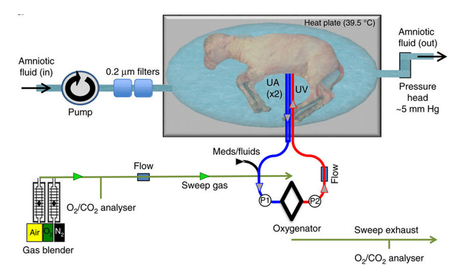A team of researchers have developed a viable artificial womb, and tested the device on sheep models. The device may transform care for extremely premature infants: After birth, they would be immersed in lab-made amniotic fluid — and kept underwater for weeks.
Researchers have shown it's possible to nurture and protect lambs in late stages of gestation inside an artificial womb. The breakthrough technology could become a lifesaver for premature human babies in just a few years and could revolutionize neonatal care.
The device works by works by two major components. First, a circulatory system that allows the baby to get oxygen through the blood (rather than through the lungs), just like in the womb. This is a process called oxygenation. The other component is a fluid environment – the fetus is enclosed in a heavy-duty bag filled with lab-made amniotic fluid.
The research has been published in the journal, Nature Communications

Researchers Emily Partridge, MD, PhD, and Marcus Davey, PhD; neonatologist Kevin Dysart, MD; and pediatric and fetal surgeon and director of the Center for Fetal Research, Alan Flake, MD, hope to translate this system into a clinical therapy for human babies.
In the future, the team hopes to see the device become an innovative solution used in neonatal intensive care units to support extremely premature infants, such as a 23 or 24-week old baby who is faced with extreme challenges adapting to life outside the uterus. Babies born at or before 25 weeks have quite low survival outcomes, and in the US it is the leading cause of infant mortality and morbidity.
“Just looking at them it's immediately clear that they shouldn't be here yet, they're not ready,” said Emily Partridge, a doctor for critically premature infants at the Children's Hospital of Philadelphia (CHOP) and one of the researchers.
The artificial womb offers the promise that babies can continue developing – even just a few weeks extra ‘growing time' can be the difference between severe health problems and a relatively healthy baby.
“These infants have an urgent need for a bridge between the mother's womb and the outside world,” says Alan Flake, senior researcher for the study and a foetal surgeon at the CHOP.
“If we can develop an extra-uterine system to support growth and organ maturation for only a few weeks, we can dramatically improve outcomes for extremely premature babies.”
The researchers took eight lambs between 105 to 120 days gestation (the physiological equivalent of 23 to 24 weeks in humans) and placed them inside the artificial womb.
“We've been extremely successful in replacing the conditions in the womb in our lamb model.”
“We've been extremely successful in replacing the conditions in the womb in our lamb model,” Flake told Rob Stein at NPR.
If their animal results translate into clinical care, Flake envisions that a decade from now, extremely premature infants would continue to develop in chambers filled with amniotic fluid, rather than lying in incubators, attached to ventilators.

